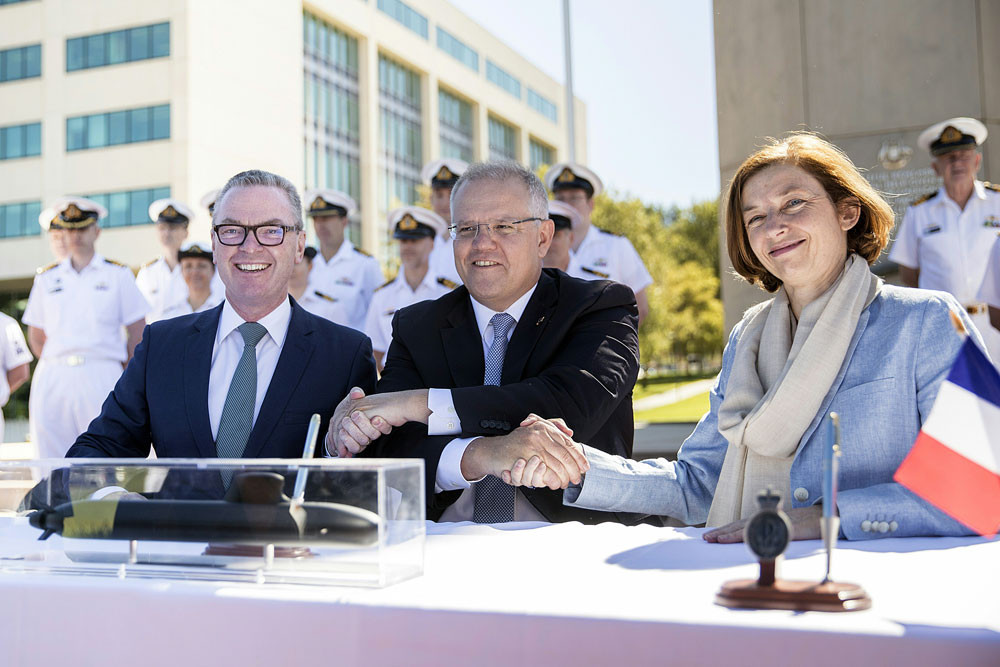Popular Reads
Top Results
Can't find what you're looking for?
View all search resultsPopular Reads
Top Results
Can't find what you're looking for?
View all search resultsAustralia stakes maritime future in Indo-Pacific region
Australia's record-breaking submarine deal with French manufacturers last week presents the country's latest move to consolidate its strategic interests in a nascent Indo-Pacific region.
Change text size
Gift Premium Articles
to Anyone
A
ustralia has placed the Indo-Pacific front and center of its wider foreign policy and defense strategy with a greater push to maritime defense and security, beginning with its record-breaking submarine deal last week.
A spokesperson for the Australian Embassy in Jakarta has said the doubling in size of Australia’s submarine fleet recognizes that it will face a more challenging maritime environment in the future – particularly in the Indo-Pacific.
“By 2035, around half of the world’s submarines will be operating in the Indo-Pacific region, where Australia’s interests are most engaged,” the spokesperson said recently.
“Australia has one of the largest maritime domains in the world and we need the capacity to defend our interests from the Pacific to the Indian Oceans and from the areas to our north to the Southern Ocean.”
The concept of the Indo-Pacific is still new but its use in strategic and policy contexts has grown considerably in recent years. Australia, in particular, has seen a noticeable swing to the Indo-Pacific concept in their latest Defense White Paper and Foreign Policy reports.
Similar shifts in reports can also been seen by Japan with its “Free and Open Indo-Pacific”, the United States in its 2017 National Security Strategy and India with its “Act East” policy.
In November last year, President Joko “Jokowi” Widodo revealed Indonesia’s vision for the Indo-Pacific, saying its strategy was based on openness, cooperation, dialogue and respect for international law and ASEAN centrality.
It has become a new way for governments to frame their policy choices, signifying Asia’s increasing role in global affairs, economic and security cooperation, as well as a counterweight to the vastly growing influence of China, experts say.
Yet what exactly the Indo-Pacific is continues to be up for debate. Despite some similarities in approaches, countries continue to hold different ideas of what the Indo-Pacific represents and what they hope to achieve from it.
The United States and Japan have emphasized a “free and open” Indo-Pacific, focusing largely on a select few key states in the region, while Indonesian and Indian definitions have kept a broader view, with a greater willingness towards China and all nations within the Indo-Pacific region.
This lack of a unified strategy means the Indo-Pacific has remained largely academic for many states but Australia’s submarine deal represents one of the biggest actions for the Indo-Pacific thus far – solidifying the region’s importance to Australia.
As part of the A$50 billion (US$35.7 billion) contract signed with French shipbuilder Naval Group, the submarines – which will begin construction in 2023 – are expected to be a major feature throughout the Indo-Pacific.
“This means we are ensuring we are at the front of the pack when it comes to the latest naval vessels and firepower,” Prime Minister Scott Morrison recently told reporters in Canberra, according to transcripts made available to The Jakarta Post.
According to Australia’s latest Defense White Paper 2016, Australia’s biggest strategic defense interests included the need for a stable Indo-Pacific region and supporting maritime security in Southeast Asia, which will be achieved primarily by Australia’s new submarines and large-scale maritime development.
Australia also plans to spend a record A$200 billion over the next 10 years – a 60 percent budget growth from the previous decade – with a large part going towards the maritime sector.
The government also plans to increase investment in the Defense Cooperation Program to build confidence and the capacity of countries in the Indo-Pacific region, including doubling the training Defense provides in Australia for international military students over the next 15 years.
– The writer is an intern at The Jakarta Post under the ACICIS program.










